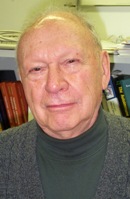
A Wayne State University research team has secured a $1.67 million National Institutes of Health grant to investigate the possibility of a simple blood test to diagnose breast cancer.
Felix Fernandez-Madrid, M.D., Ph.D., professor of Internal Medicine, will serve as principal investigator of the research, which is a collaboration of School of Medicine faculty, including Judith Abrams, Ph.D.; Wei Chen, Ph.D.; and Naimei Tang, Ph.D.; as well as members of the Henry Ford Health System Departments of Pathology (Azadeh Stark, Ph.D.; Richard Zarbo, M.D.; and Arun Dhananjay, M.D.), Radiology (Matthew Burke, M.D.); and Surgery (David Nathanson M.D.).
The research will attempt to develop a diagnostic test based on proteins called autoantibodies that could detect accurately the earliest forms -- as well as the invasive forms -- of breast cancer.
The outcome of the project, Dr. Fernandez-Madrid explained, may be a new antibody-based diagnostic instrument that could prove to be an accurate, relatively inexpensive, accessible, rapid and easy-to-administer blood test for the early diagnosis of breast cancer.
"If successful, this test -- used in conjunction with mammography -- has the potential to complement and increase the accuracy of the screening process," Dr. Fernandez-Madrid said. "By reducing the false negative results of mammography, the increased accuracy of the screening process would lead to earlier recognition of breast cancer and better responses to therapy, while the decrease of false positive mammography results would alleviate women's anxiety, and would diminish the cost incurred in unnecessary additional diagnostic procedures and surgery."
The spark for the research occurred, Dr. Fernandez-Madrid explained, when he was treating a rheumatoid patient, who later developed breast cancer. He drew a blood sample after her cancer treatment and found the autoantibodies. He compared the post-treatment sample with a sample drawn before treatment and found the autoantibodies in her blood. That catalyst led to the proposition that the autoantibodies could be a primary indicator for breast cancer.
Dr. Fernandez-Madrid, who is also a member of the School of Medicine's Center for Molecular Medicine and Genetics, and the Karmanos Cancer Institute, said the NIH grant runs for three years.
The research secured a previous three-year NIH grant for $223,500 in 2001.